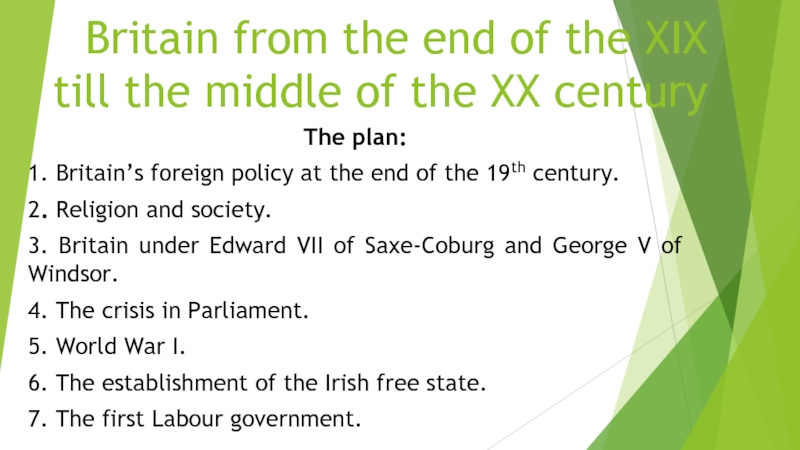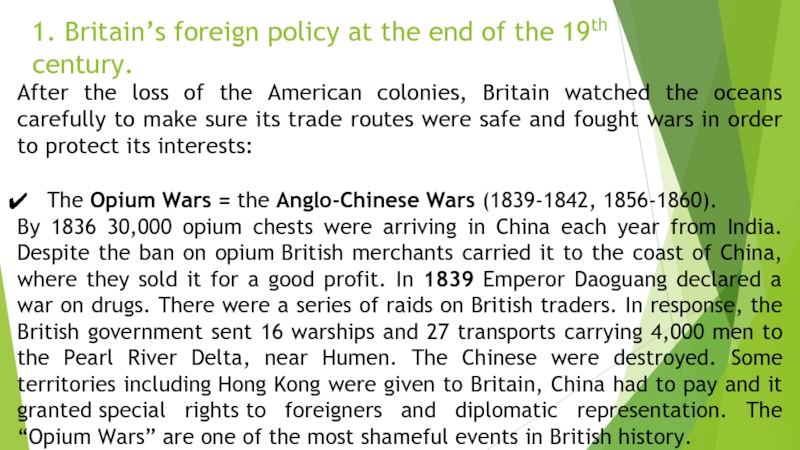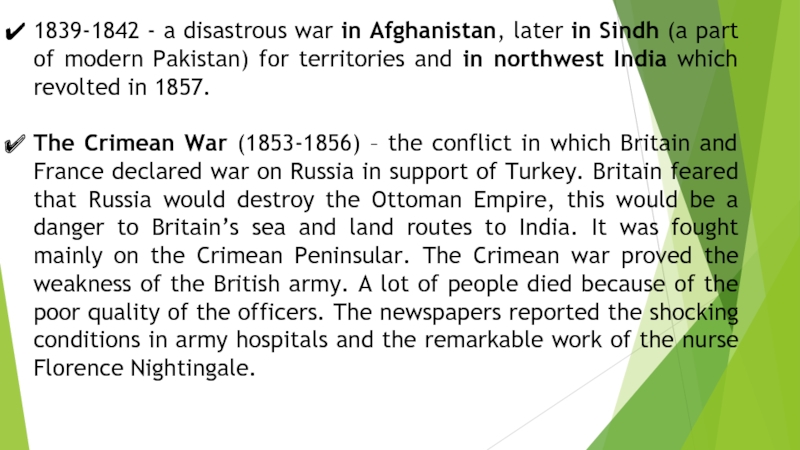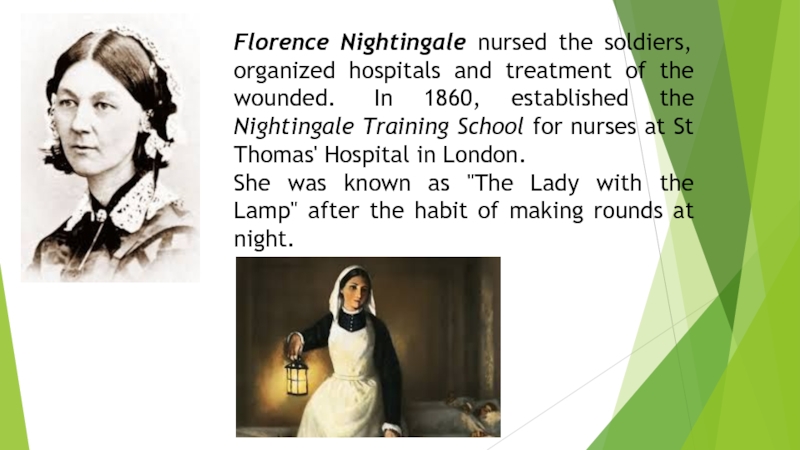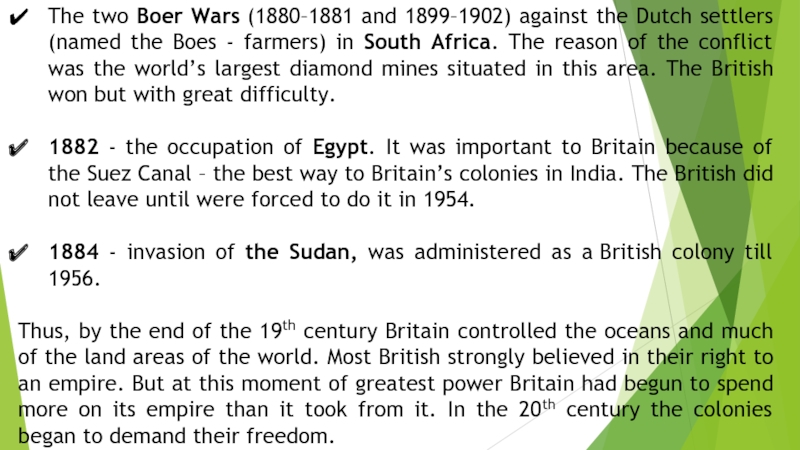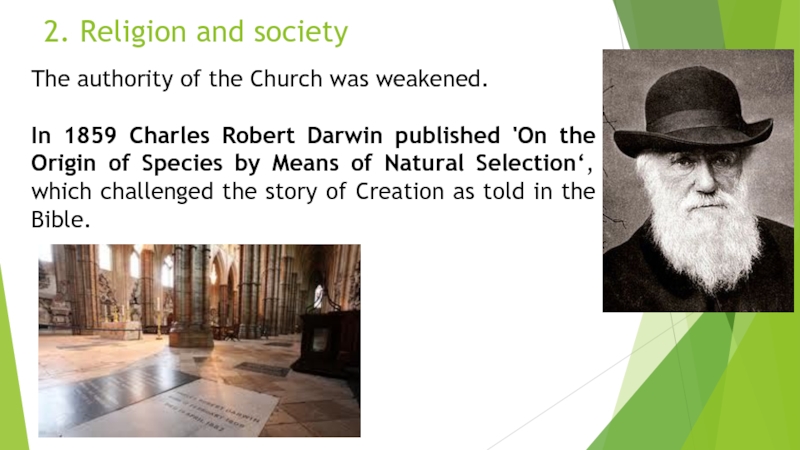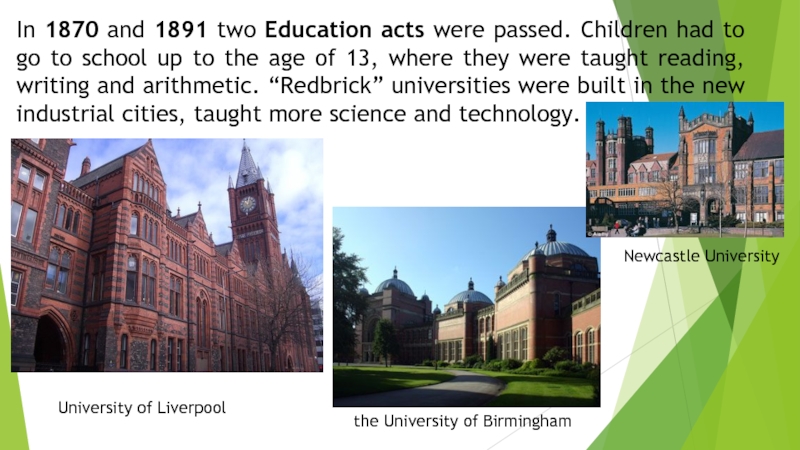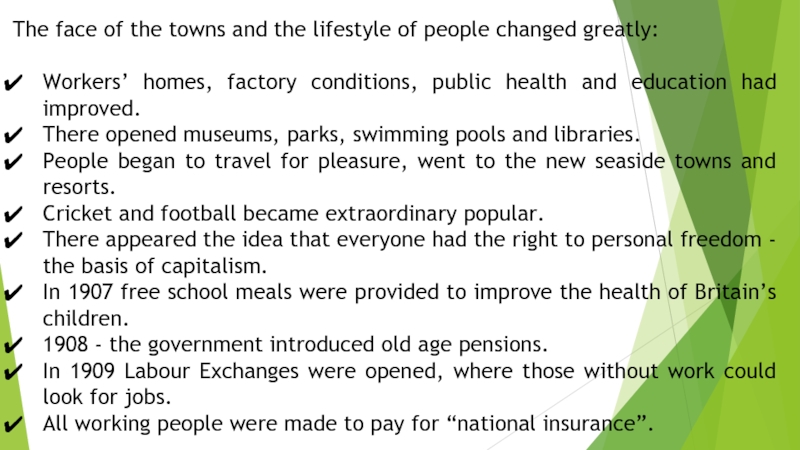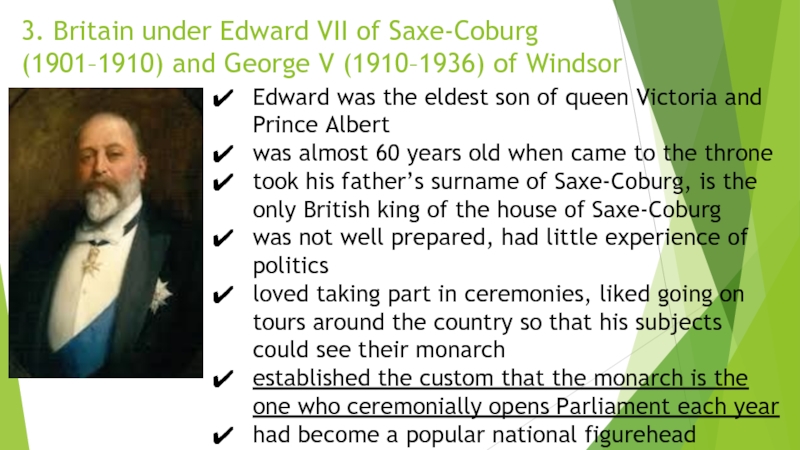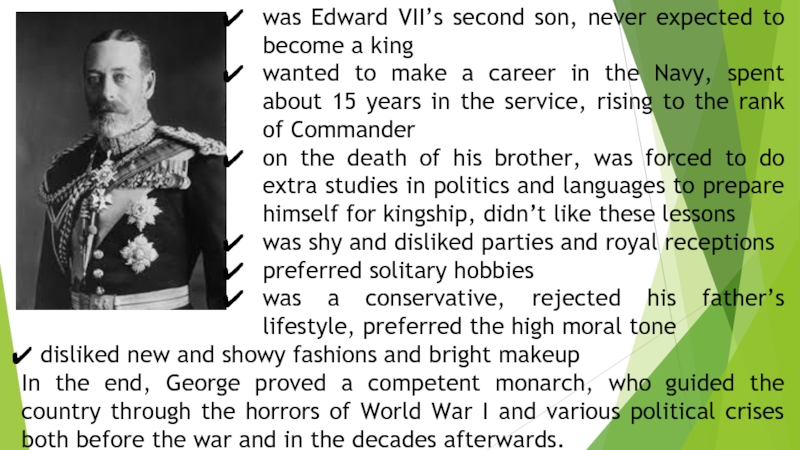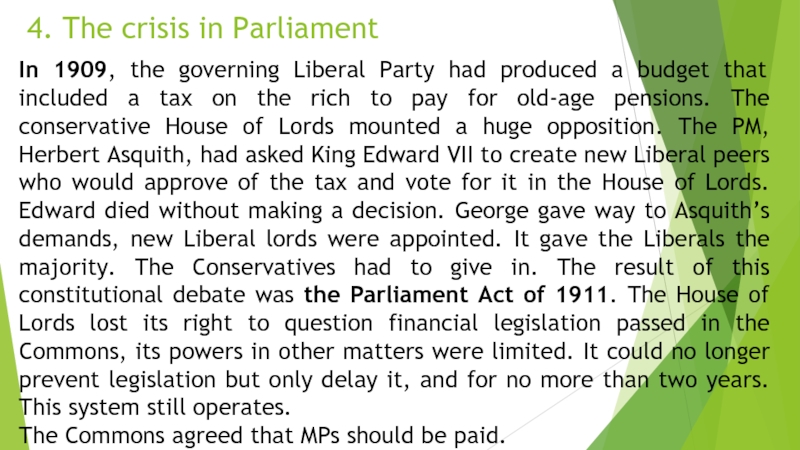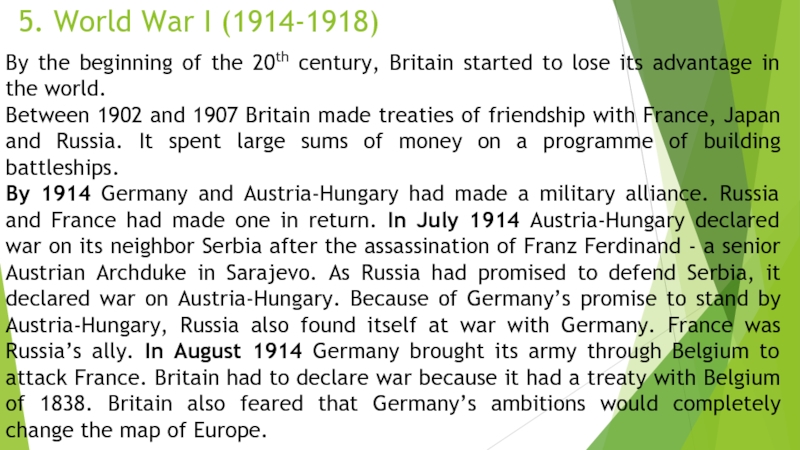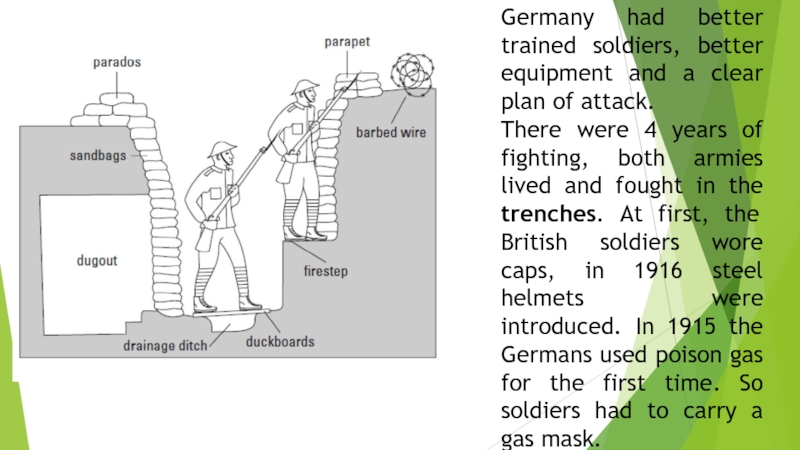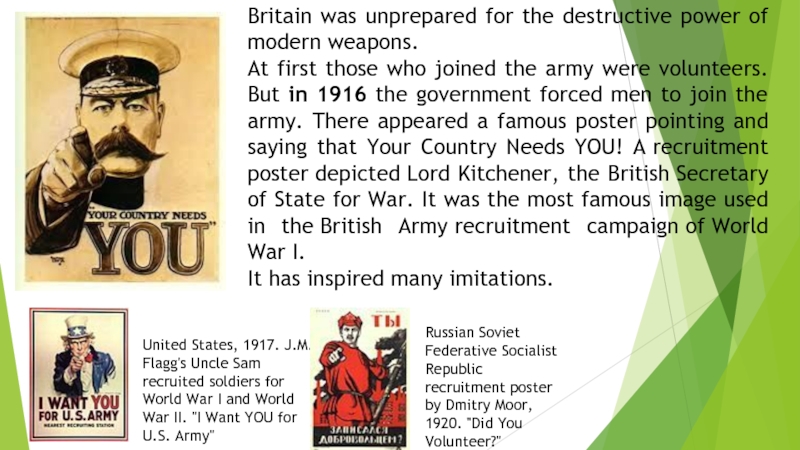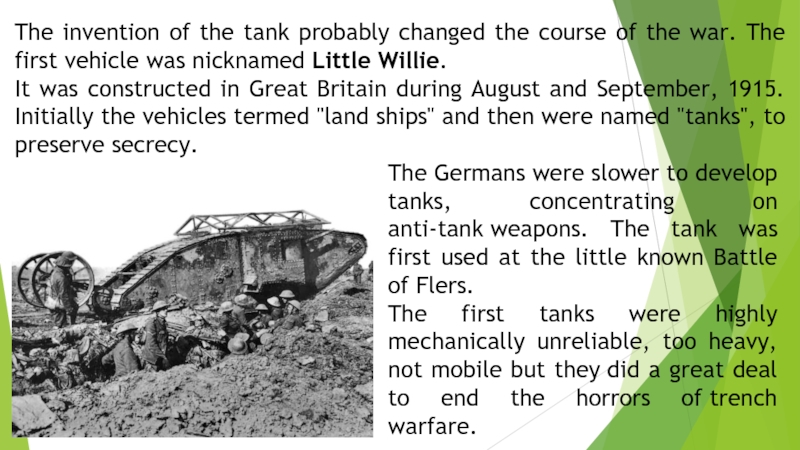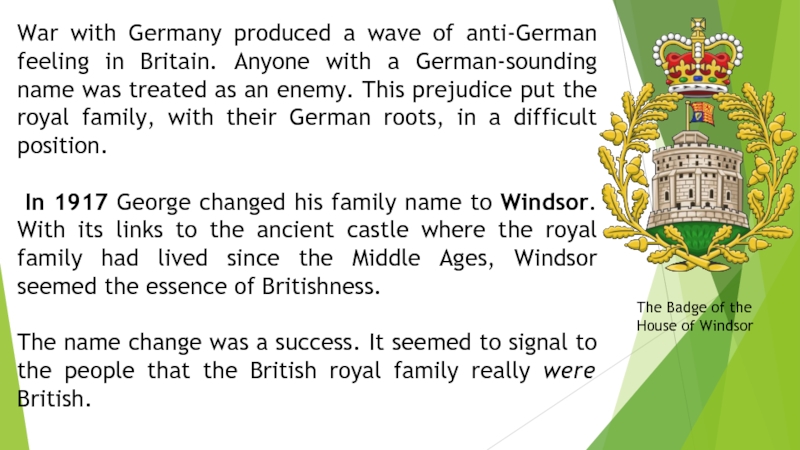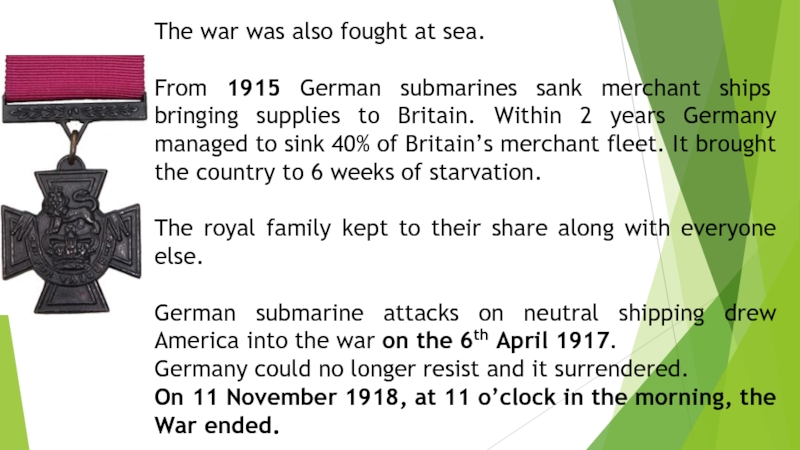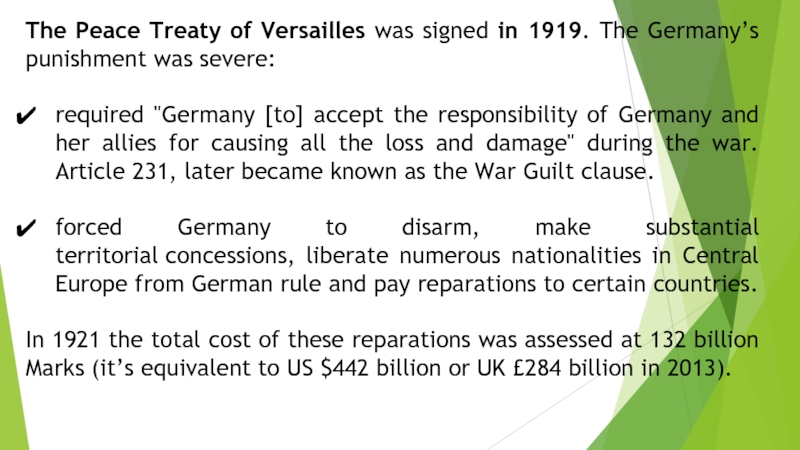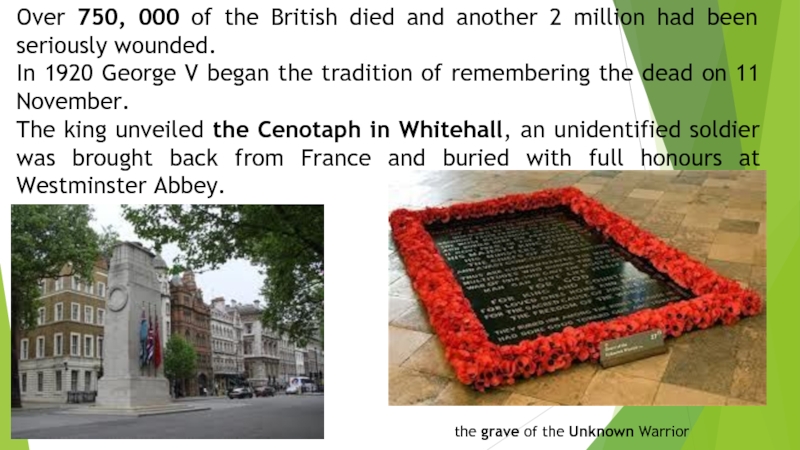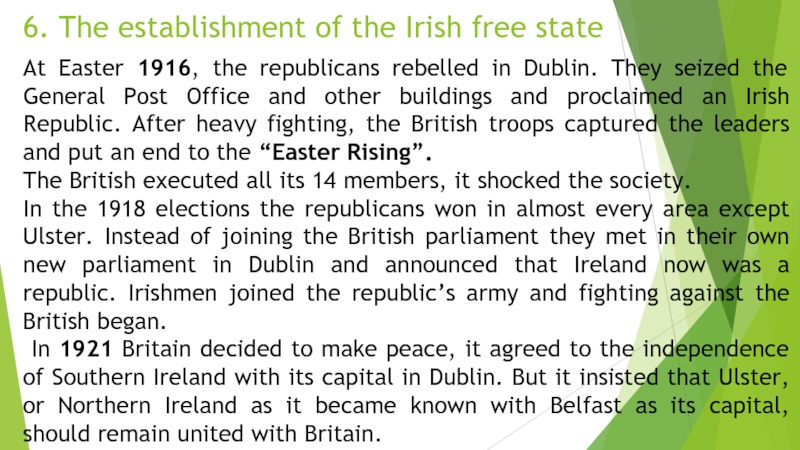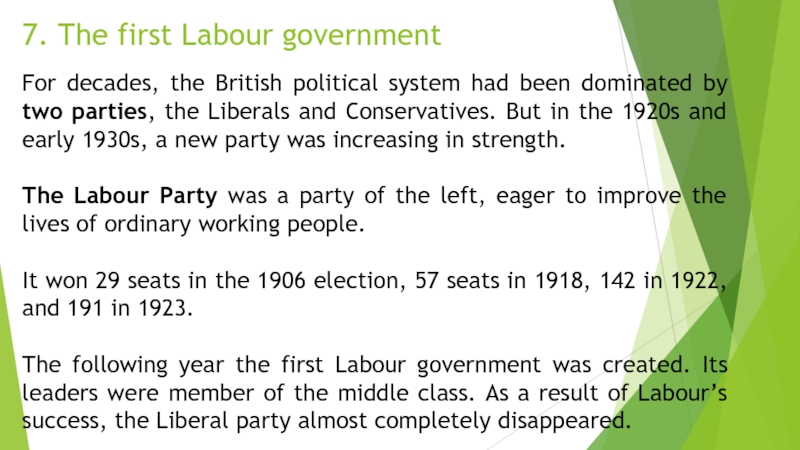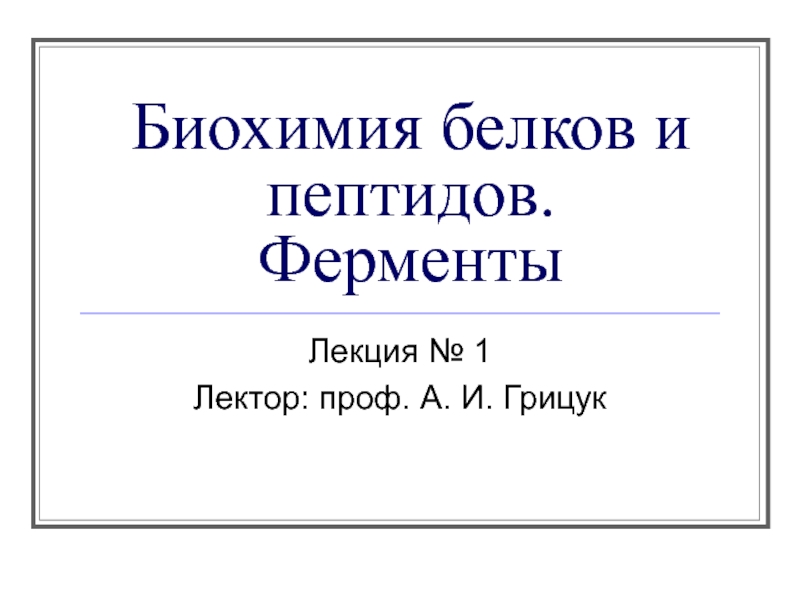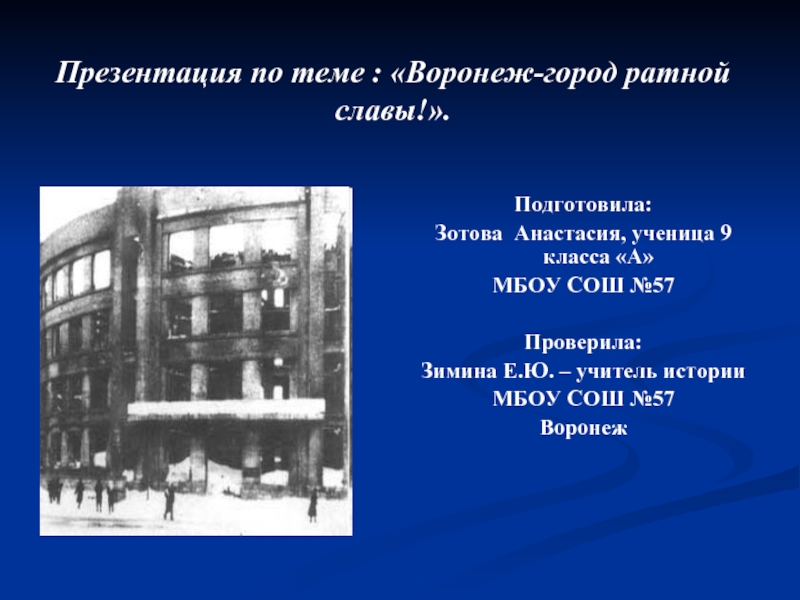Слайд 1Britain from the end of the XIX till the middle
of the XX century
The plan:
1. Britain’s foreign policy at the
end of the 19th century.
2. Religion and society.
3. Britain under Edward VII of Saxe-Coburg and George V of Windsor.
4. The crisis in Parliament.
5. World War I.
6. The establishment of the Irish free state.
7. The first Labour government.
Слайд 21. Britain’s foreign policy at the end of the 19th
century.
After the loss of the American colonies, Britain watched the
oceans carefully to make sure its trade routes were safe and fought wars in order to protect its interests:
The Opium Wars = the Anglo-Chinese Wars (1839-1842, 1856-1860).
By 1836 30,000 opium chests were arriving in China each year from India. Despite the ban on opium British merchants carried it to the coast of China, where they sold it for a good profit. In 1839 Emperor Daoguang declared a war on drugs. There were a series of raids on British traders. In response, the British government sent 16 warships and 27 transports carrying 4,000 men to the Pearl River Delta, near Humen. The Chinese were destroyed. Some territories including Hong Kong were given to Britain, China had to pay and it granted special rights to foreigners and diplomatic representation. The “Opium Wars” are one of the most shameful events in British history.
Слайд 31839-1842 - a disastrous war in Afghanistan, later in Sindh
(a part of modern Pakistan) for territories and in northwest
India which revolted in 1857.
The Crimean War (1853-1856) – the conflict in which Britain and France declared war on Russia in support of Turkey. Britain feared that Russia would destroy the Ottoman Empire, this would be a danger to Britain’s sea and land routes to India. It was fought mainly on the Crimean Peninsular. The Crimean war proved the weakness of the British army. A lot of people died because of the poor quality of the officers. The newspapers reported the shocking conditions in army hospitals and the remarkable work of the nurse Florence Nightingale.
Слайд 4Florence Nightingale nursed the soldiers, organized hospitals and treatment of
the wounded. In 1860, established the Nightingale Training School for
nurses at St Thomas' Hospital in London.
She was known as "The Lady with the Lamp" after the habit of making rounds at night.
Слайд 5The two Boer Wars (1880–1881 and 1899–1902) against the Dutch settlers
(named the Boes - farmers) in South Africa. The reason
of the conflict was the world’s largest diamond mines situated in this area. The British won but with great difficulty.
1882 - the occupation of Egypt. It was important to Britain because of the Suez Canal – the best way to Britain’s colonies in India. The British did not leave until were forced to do it in 1954.
1884 - invasion of the Sudan, was administered as a British colony till 1956.
Thus, by the end of the 19th century Britain controlled the oceans and much of the land areas of the world. Most British strongly believed in their right to an empire. But at this moment of greatest power Britain had begun to spend more on its empire than it took from it. In the 20th century the colonies began to demand their freedom.
Слайд 62. Religion and society
The authority of the Church was weakened.
In 1859 Charles Robert Darwin published 'On the Origin of
Species by Means of Natural Selection‘, which challenged the story of Creation as told in the Bible.
Слайд 7In 1870 and 1891 two Education acts were passed. Children
had to go to school up to the age of
13, where they were taught reading, writing and arithmetic. “Redbrick” universities were built in the new industrial cities, taught more science and technology.
University of Liverpool
the University of Birmingham
Newcastle University
Слайд 8The face of the towns and the lifestyle of people
changed greatly:
Workers’ homes, factory conditions, public health and education had
improved.
There opened museums, parks, swimming pools and libraries.
People began to travel for pleasure, went to the new seaside towns and resorts.
Cricket and football became extraordinary popular.
There appeared the idea that everyone had the right to personal freedom - the basis of capitalism.
In 1907 free school meals were provided to improve the health of Britain’s children.
1908 - the government introduced old age pensions.
In 1909 Labour Exchanges were opened, where those without work could look for jobs.
All working people were made to pay for “national insurance”.
Слайд 93. Britain under Edward VII of Saxe-Coburg
(1901–1910) and George V
(1910–1936) of Windsor
Edward was the eldest son of queen Victoria
and Prince Albert
was almost 60 years old when came to the throne
took his father’s surname of Saxe-Coburg, is the only British king of the house of Saxe-Coburg
was not well prepared, had little experience of politics
loved taking part in ceremonies, liked going on tours around the country so that his subjects could see their monarch
established the custom that the monarch is the one who ceremonially opens Parliament each year
had become a popular national figurehead
Слайд 10was Edward VII’s second son, never expected to become a
king
wanted to make a career in the Navy, spent about
15 years in the service, rising to the rank of Commander
on the death of his brother, was forced to do extra studies in politics and languages to prepare himself for kingship, didn’t like these lessons
was shy and disliked parties and royal receptions
preferred solitary hobbies
was a conservative, rejected his father’s lifestyle, preferred the high moral tone
disliked new and showy fashions and bright makeup
In the end, George proved a competent monarch, who guided the country through the horrors of World War I and various political crises both before the war and in the decades afterwards.
Слайд 114. The crisis in Parliament
In 1909, the governing Liberal Party
had produced a budget that included a tax on the
rich to pay for old-age pensions. The conservative House of Lords mounted a huge opposition. The PM, Herbert Asquith, had asked King Edward VII to create new Liberal peers who would approve of the tax and vote for it in the House of Lords. Edward died without making a decision. George gave way to Asquith’s demands, new Liberal lords were appointed. It gave the Liberals the majority. The Conservatives had to give in. The result of this constitutional debate was the Parliament Act of 1911. The House of Lords lost its right to question financial legislation passed in the Commons, its powers in other matters were limited. It could no longer prevent legislation but only delay it, and for no more than two years. This system still operates.
The Commons agreed that MPs should be paid.
Слайд 125. World War I (1914-1918)
By the beginning of the 20th
century, Britain started to lose its advantage in the world.
Between 1902 and 1907 Britain made treaties of friendship with France, Japan and Russia. It spent large sums of money on a programme of building battleships.
By 1914 Germany and Austria-Hungary had made a military alliance. Russia and France had made one in return. In July 1914 Austria-Hungary declared war on its neighbor Serbia after the assassination of Franz Ferdinand - a senior Austrian Archduke in Sarajevo. As Russia had promised to defend Serbia, it declared war on Austria-Hungary. Because of Germany’s promise to stand by Austria-Hungary, Russia also found itself at war with Germany. France was Russia’s ally. In August 1914 Germany brought its army through Belgium to attack France. Britain had to declare war because it had a treaty with Belgium of 1838. Britain also feared that Germany’s ambitions would completely change the map of Europe.
Слайд 13Germany had better trained soldiers, better equipment and a clear
plan of attack.
There were 4 years of fighting, both
armies lived and fought in the trenches. At first, the British soldiers wore caps, in 1916 steel helmets were introduced. In 1915 the Germans used poison gas for the first time. So soldiers had to carry a gas mask.
Слайд 14Britain was unprepared for the destructive power of modern weapons.
At first those who joined the army were volunteers. But
in 1916 the government forced men to join the army. There appeared a famous poster pointing and saying that Your Country Needs YOU! A recruitment poster depicted Lord Kitchener, the British Secretary of State for War. It was the most famous image used in the British Army recruitment campaign of World War I.
It has inspired many imitations.
United States, 1917. J.M. Flagg's Uncle Sam recruited soldiers for World War I and World War II. "I Want YOU for U.S. Army"
Russian Soviet Federative Socialist Republic recruitment poster by Dmitry Moor, 1920. "Did You Volunteer?"
Слайд 15
The Germans were slower to develop tanks, concentrating on anti-tank weapons. The
tank was first used at the little known Battle of
Flers.
The first tanks were highly mechanically unreliable, too heavy, not mobile but they did a great deal to end the horrors of trench warfare.
The invention of the tank probably changed the course of the war. The first vehicle was nicknamed Little Willie.
It was constructed in Great Britain during August and September, 1915. Initially the vehicles termed "land ships" and then were named "tanks", to preserve secrecy.
Слайд 16War with Germany produced a wave of anti-German feeling in
Britain. Anyone with a German-sounding name was treated as an
enemy. This prejudice put the royal family, with their German roots, in a difficult position.
In 1917 George changed his family name to Windsor. With its links to the ancient castle where the royal family had lived since the Middle Ages, Windsor seemed the essence of Britishness.
The name change was a success. It seemed to signal to the people that the British royal family really were British.
The Badge of the House of Windsor
Слайд 17The war was also fought at sea.
From 1915 German
submarines sank merchant ships bringing supplies to Britain. Within 2
years Germany managed to sink 40% of Britain’s merchant fleet. It brought the country to 6 weeks of starvation.
The royal family kept to their share along with everyone else.
German submarine attacks on neutral shipping drew America into the war on the 6th April 1917.
Germany could no longer resist and it surrendered.
On 11 November 1918, at 11 o’clock in the morning, the War ended.
Слайд 18The Peace Treaty of Versailles was signed in 1919. The
Germany’s punishment was severe:
required "Germany [to] accept the responsibility of
Germany and her allies for causing all the loss and damage" during the war. Article 231, later became known as the War Guilt clause.
forced Germany to disarm, make substantial territorial concessions, liberate numerous nationalities in Central Europe from German rule and pay reparations to certain countries.
In 1921 the total cost of these reparations was assessed at 132 billion Marks (it’s equivalent to US $442 billion or UK £284 billion in 2013).
Слайд 19Over 750, 000 of the British died and another 2
million had been seriously wounded.
In 1920 George V began
the tradition of remembering the dead on 11 November.
The king unveiled the Cenotaph in Whitehall, an unidentified soldier was brought back from France and buried with full honours at Westminster Abbey.
the grave of the Unknown Warrior
Слайд 206. The establishment of the Irish free state
At Easter 1916,
the republicans rebelled in Dublin. They seized the General Post
Office and other buildings and proclaimed an Irish Republic. After heavy fighting, the British troops captured the leaders and put an end to the “Easter Rising”.
The British executed all its 14 members, it shocked the society.
In the 1918 elections the republicans won in almost every area except Ulster. Instead of joining the British parliament they met in their own new parliament in Dublin and announced that Ireland now was a republic. Irishmen joined the republic’s army and fighting against the British began.
In 1921 Britain decided to make peace, it agreed to the independence of Southern Ireland with its capital in Dublin. But it insisted that Ulster, or Northern Ireland as it became known with Belfast as its capital, should remain united with Britain.
Слайд 217. The first Labour government
For decades, the British political system
had been dominated by two parties, the Liberals and Conservatives.
But in the 1920s and early 1930s, a new party was increasing in strength.
The Labour Party was a party of the left, eager to improve the lives of ordinary working people.
It won 29 seats in the 1906 election, 57 seats in 1918, 142 in 1922, and 191 in 1923.
The following year the first Labour government was created. Its leaders were member of the middle class. As a result of Labour’s success, the Liberal party almost completely disappeared.
